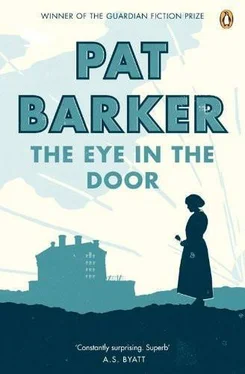Don’t think about it , he told himself. It was too late in the day to risk thinking about that.
He had no memory of Beattie’s face. She’d been an object then, a mountain, the side of a house, vast, taken for granted, not a person to whom you could attach adjectives. Though he could attach them readily enough now: lively, opinionated, intelligent, uneducated, foul-mouthed, impulsive, generous, quick-tempered, kind. Prior’s mother, his gentle and, it had to be said, genteel mother, hated Beattie Roper, though, when his mother became ill with suspected tuberculosis, it was to Beattie he’d been sent. That must have been his father’s decision.
For almost a year, when he was five or six years old, he’d lived with Beattie and played with her two daughters, Winnie, who was now in Leeds Prison, and Hettie, who’d been charged with conspiracy to murder, but acquitted. He’d been the baby, when they played houses; the customer, when they played shops; the pupil, when they played schools; the patient, when they played nurses; and all these roles had been extremely boring, except, now and then, the role of patient.
They’d played under the big table in the kitchen, because its green tasselled cloth hanging down all round them made a separate world. Particularly on wash days, when the house was invaded by smells of soda, Dolly Blue and wet wool, and the wind blew grit in from the yard, the table was their refuge. Between the green tassels they looked out at adult boots coming and going, and felt a pleasant sense of power.
Mr Carker’s boots. Mr Carker was secretary of the Independent Labour Party, and sometimes he and Beattie sat together at the table, discussing politics. These discussions had been, in every sense, above Prior’s head, though he remembered one remark of Mr Carker’s to the effect that the suffragettes simply exploited working-class women like Beattie. ‘It’s all very well, talking about sisterhood, but when they go home at night and drop their knickers, it’s somebody else’s job to pick them up.’
Probably it was the reference to dropping knickers that had made that particular remark stick in his mind. Perhaps it excited Mr Carker too, for shortly afterwards his boot crept along the floor and brushed against Beattie’s foot. She moved her foot. The boot followed, accompanied this time by a hand on her knee, a hand that just lifted the green tassels. Prior looked round and saw Hettie’s stricken face. It was a house with no father, and all the children, but particularly Hettie, were passionate in defence of their mother. For the first time in his life, perhaps, Prior was aware of another’s pain. Stealthily, he reached out and tied Mr Carker’s boot laces together, so that when, finally, he got up to go, he tripped and measured his full length on the floor.
The disciplining of children must have been the only subject on which Beattie held no advanced views. She’d hauled him out of his hiding place, tipped him over her knee and tanned his arse; and he’d clenched his teeth, divided between a blaze of joy that he was suffering for Hettie’s sake, and regret that the suffering should not have taken a more dignified form.
Major Lode, interviewing him for his present post, had leant across the table and said, ‘You see, you know these people, don’t you?’
Prior took a last drag of his cigarette, leant over the edge of the bed and stubbed it out in the ashtray. Yes .
He drew the curtains and got inside the sheets. He was afraid to go to sleep, but he had learnt, from long experience, that to keep himself awake at night only to fall asleep shortly before dawn made for the worst nightmares of all. He lay and stared at the ceiling, unblinking, until his eyelids prickled, then rolled over on to his side and brought his knees up to his chin.
He was back in the winter landscape, with a sound like wind blowing, only it was not the wind, but the sound of emptiness. A hawk flew over and he watched its shadow on the snow. They were marching back. His boot went through thin ice into freezing mud. The ice meshed out round his foot, white opaque lines radiating out so that he stood at the centre of a frozen web.
The cold half woke him. He found his leg outside the covers and brought it back inside, but now his whole body was cold. He was lying naked on a stone floor. Because his sleep was light, he knew he was dreaming, and he knew also that he had to wake up before something worse happened. He turned and saw the eye watching him, an eye not painted but very much alive. The white glittered in the moonlight. The same noise of emptiness he’d heard in France had followed him into the cell. He stared at the eye, and then, by a supreme effort of will, forced himself to sit up.
Sweating and clammy, he reached down for his cigarettes, and remembered he’d left them on the desk. He got up and felt his way along, not wanting to switch on the light because the horror of the nightmare was heavy on him, and he was afraid of what the glare might reveal. He was standing by the desk, in the half-darkness, dabbing his hands among his papers, searching for the cigarette packet, when he heard a chuckle and spun round. The eye was watching him from the door. He shrank back against the table, his hands groping behind him for the paper-knife. His fingers closed round the hilt and he sprang at the door, stabbing the eye again and again, his naked body spattered with blood and some thick whitish fluid that did not drip but clung to his belly, and quickly chilled. Then, exhausted, he slipped to the floor and lay there, sobbing, and the sound of his sobbing woke him up.
At first he simply stared at the door. Only when he was sure there was no eye did he start to relax and take in the strangeness of his position. The fingertips of his right hand patted the cold oilcloth, as if by touching it he could make it turn into a mattress and sheets. No, he was out of bed, lying on the floor. Nightmare, he thought, drawing a deep breath. He started to pull himself up, feeling a wetness in his groin, and, as he did so, his splayed fingers touched the knife. So that had been real. With a spasm of revulsion, he struck out at it and sent it skittering across the floor.
The aerodrome consisted of two runways and a straggle of low buildings set in one corner of a field.
Rivers and Dundas got out of the car and stood looking at the sky: clear, except for one bank of dark cloud away on the horizon.
‘Good weather for it, anyway,’ Dundas said.
It was possible to tell he was frightened, but only because Rivers had been observing him closely for weeks. Dundas suffered from abnormal reactions in the air. Where healthy pilots experienced no sensation at all, Dundas reported feeling his head squashed into his body, or a loss of movement in his legs. He suffered from nausea. More seriously still, he had more than once experienced the preliminary stages of a faint. After every physiological test possible had proved negative, he had been handed over to Rivers for psychological observation. Unfortunately, Rivers was making no progress. Dundas seemed to be exactly the sort of cheerful, likable, slightly irresponsible young man he’d grown accustomed to dealing with in the Royal Flying Corps. Apart from flying, his main interests were amateur dramatics, music and girls, not necessarily in that order. He appeared, in fact, to be entirely normal. Until he got into an aeroplane. And they were here to do just that.
‘We seem to have arrived a bit early,’ Dundas said. ‘Would you like a cup of tea?’
The canteen was empty, except for a group of young fliers gathered round a table in the far corner, most of them in their twenties, one ginger-haired lad noticeably younger. Dundas went off to get the tea, and Rivers sat down at a table whose entire surface was covered with interlocking rings of tea stains. The young men were reading newspapers, chatting in a desultory fashion about the events of the day: the massive German advance, Maud Allan’s libel action against Pemberton Billing, the cult of the clitoris. A dark-haired young man held up a photograph of Maud Allan. ‘If she ever fancies anything bigger she’s welcome to knock on my door.’
Читать дальше












